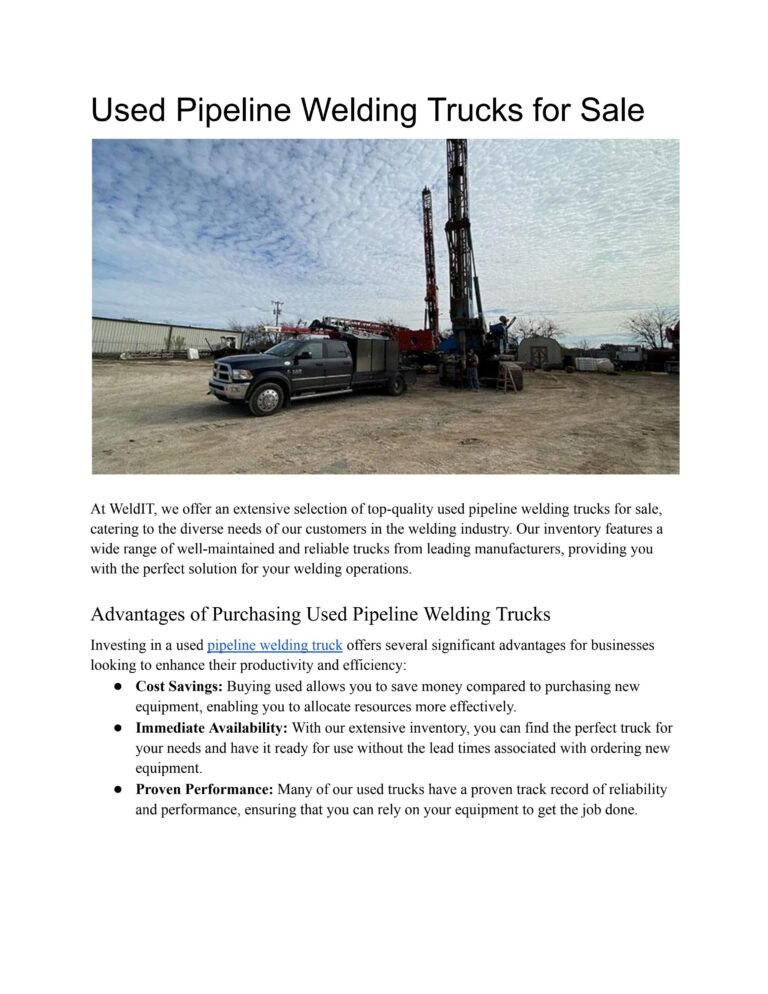Timeless Torque: The Enduring Appeal of Vintage Diesel Trucks for Sale

Timeless Torque: The Enduring Appeal of Vintage Diesel Trucks for Sale
The air thrums with a deep, guttural rumble, a sound that speaks of raw power, unyielding endurance, and a bygone era of mechanical simplicity. A wisp of diesel smoke, a scent both nostalgic and robust, hangs briefly before dissipating. This isn’t the sterile hum of modern, emissions-controlled machinery; this is the unmistakable presence of a vintage diesel truck. For a growing legion of enthusiasts, collectors, and practical users, these venerable workhorses aren’t just vehicles – they’re rolling monuments to a different kind of engineering, offering a unique blend of heritage, utility, and an investment in an increasingly rare piece of Americana.
In a world obsessed with fleeting trends and disposable technology, the vintage diesel truck stands apart. It represents a commitment to durability, a preference for repairability over replacement, and an aesthetic that is unapologetically rugged. But what defines "vintage" in this context, and why are these heavy metal beasts gaining such traction in the collector’s market and among those seeking a truly unique daily driver or farm truck?
Defining the Vintage Diesel Era
While "vintage" can be subjective, for diesel trucks, it generally refers to vehicles built from the 1960s through the late 1990s, before the widespread implementation of highly complex electronic controls, intricate emissions systems (like DPFs and DEF), and common-rail fuel injection. This period is characterized by:
- Mechanical Simplicity: Fuel systems were largely mechanical, relying on robust injection pumps (like the legendary Bosch P7100 or Stanadyne DB2) rather than sophisticated electronic control units.
- Minimal Emissions Gear: Exhaust Gas Recirculation (EGR) was rare, and diesel particulate filters (DPF) and selective catalytic reduction (SCR) with Diesel Exhaust Fluid (DEF) were unheard of. This means fewer sensors, fewer potential failure points, and a more direct, less restrictive exhaust flow.
- Durability Over Refinement: These trucks were built to work, plain and simple. Frames were overbuilt, sheet metal was thicker, and engines were designed for hundreds of thousands, if not millions, of miles of heavy-duty service.
- Iconic Styling: From the squared-off lines of 70s Ford F-Series and Chevy C/K trucks to the majestic chrome and imposing grilles of Peterbilt and Kenworth big rigs, the styling of this era is instantly recognizable and deeply appealing.
The Enduring Allure: Why Buy a Vintage Diesel?
The reasons for seeking out a vintage diesel truck are as varied as the trucks themselves:
-
Unmatched Durability and Longevity: Engines like the Cummins 12-valve 5.9L, the Ford 7.3L IDI and Power Stroke, the Detroit Diesel 2-strokes, and various Caterpillar and Mack engines were engineered to be bomb-proof. Many of these trucks, properly maintained, have well over a million miles on their original powertrains. They were built in an era when products were expected to last, not to be replaced every few years.
-
Mechanical Simplicity and Repairability: Without the labyrinthine wiring harnesses, sensitive sensors, and complex software of modern diesels, vintage models are often easier for the shade-tree mechanic or a skilled independent shop to diagnose and repair. Parts, while sometimes requiring a bit of searching, are generally less expensive than their modern counterparts.
-
Distinctive Aesthetics and Nostalgia: There’s an undeniable cool factor to these trucks. Their classic lines, often adorned with chrome bumpers, steel wheels, and period-correct paint schemes, evoke a sense of nostalgia for a simpler time. They stand out in a sea of increasingly similar-looking modern vehicles. For many, owning one is a way to connect with personal history or a cherished memory.
-
Utility and Performance: Don’t let their age fool you; many vintage diesels are still highly capable workhorses. A properly sorted 12-valve Cummins or 7.3L Power Stroke truck can still pull heavy trailers with ease, and older Class 8 trucks remain perfectly capable of hauling serious freight. They offer substantial torque at low RPMs, making them ideal for towing and hauling.
-
Investment Potential: As fewer well-preserved examples remain and interest continues to grow, certain vintage diesel models are appreciating in value. A meticulously restored or exceptionally original truck can be a sound investment, offering both enjoyment and potential financial returns.
-
The Driving Experience: Driving a vintage diesel is an experience. The characteristic diesel clatter, the feel of mechanical linkages, the lack of overly assisted steering, and the sheer physical presence of the vehicle connect the driver to the road in a way that modern vehicles often don’t. It’s a raw, visceral, and incredibly satisfying sensation.
Iconic Makes and Models to Seek Out
The world of vintage diesel trucks is vast, encompassing everything from light-duty pickups to massive Class 8 tractor-trailers. Here are some of the most sought-after categories and models:
Light-Duty Pickups (Class 1-3): These are perhaps the most popular for daily driving, towing, and light hauling.
- Ford F-Series (7.3L IDI & Power Stroke): The OBS (Old Body Style) F-250s and F-350s (1992-1997) with the 7.3L Power Stroke V8 are legendary for their reliability and power. Earlier 7.3L IDI (Indirect Injection Diesel, 1988-1994) models are also highly prized for their simplicity. These trucks offer a robust platform and excellent parts availability.
- Dodge Ram (Cummins 12-Valve 5.9L): The 1989-1998 Dodge Ram trucks equipped with the 5.9L 12-valve Cummins inline-six are arguably the gold standard for vintage diesel pickups. Known for their incredible durability, ease of modification, and mechanical fuel pump (P7100), these engines are the stuff of legend. The 1994-1998 "2nd Gen" body style is particularly popular.
- Chevrolet/GMC C/K Series (Detroit Diesel & Duramax): While less common than Ford or Dodge, older GM trucks with the 6.2L and 6.5L Detroit Diesel engines (V8s) have their loyal following. Later models (1999-2000) that offered the first generation of the Isuzu-designed Duramax 6.6L V8 are also starting to enter the "vintage" conversation, though they are more electronically complex.
Medium-Duty Trucks (Class 4-7): These often served as utility trucks, dump trucks, or specialized vocational vehicles.
- International Harvester (S-Series, Loadstar): International built some incredibly tough medium-duty trucks with their own DT (Diesel Turbo) series engines (e.g., DT466) or various Cummins options. They offer serious hauling capability and a unique heritage.
- Ford F-600/F-700/F-800 & Chevrolet Kodiak/GMC TopKick: These larger versions of the popular pickups often came with larger diesel engines from Cummins, Caterpillar, or Detroit Diesel, making them ideal for heavy-duty farm work, specialized builds (like car haulers or RV conversions), or simply as imposing statements.
Heavy-Duty / Class 8 Trucks (Big Rigs): For the ultimate statement in vintage diesel, these over-the-road legends are unmatched.
- Peterbilt (359, 379): The "King of the Road," Peterbilts of this era are renowned for their classic, long-nosed styling, chrome accents, and often came equipped with powerful Cummins, Caterpillar, or Detroit Diesel engines. The 359 (produced until 1987) and its successor, the 379 (until 2007), are iconic.
- Kenworth (W900, K100): Kenworths, particularly the W900 long-nose conventional and the K100 cab-over-engine, share the Peterbilt’s reputation for quality and classic lines. They are highly customizable and have a massive following.
- Mack (R-Model, B-Model): Mack trucks, with their bulldog hood ornament, are synonymous with American trucking. The R-Model and older B-Model are highly collectible, often featuring Mack’s own robust diesel engines and unique powertrain designs.
- Freightliner, Western Star: While perhaps not as aesthetically iconic as Peterbilt or Kenworth for some, these brands also produced incredibly reliable and capable trucks that are now entering vintage status, often offering a more accessible entry point into Class 8 ownership.
Where to Find Your Dream Rig
The search for a vintage diesel truck can be part of the adventure. Options include:
- Online Marketplaces: eBay Motors, Craigslist, Facebook Marketplace, and specialized forums (e.g., Ford-Trucks.com, CumminsForum.com) are excellent starting points.
- Auctions: Local farm auctions, specialized collector vehicle auctions (Mecum, Barrett-Jackson occasionally), and commercial truck auctions can yield gems.
- Specialized Dealers: A growing number of dealers focus specifically on classic and vintage trucks. They often have higher prices but also offer vetted vehicles and sometimes warranties.
- Word of Mouth: Networking with local mechanics, farmers, or trucking companies can uncover hidden treasures.
- Barn Finds: Less common, but sometimes a lucky enthusiast stumbles upon a forgotten truck in a field or old barn.
What to Look For: A Buyer’s Guide
Purchasing a vintage diesel requires careful inspection, as even the most robust truck can succumb to neglect.
- The Engine: This is paramount. Look for excessive smoke (blue indicates oil burning, black suggests rich fuel, white could be coolant or unburnt fuel), listen for unusual noises (knocking, ticking), check for leaks, and assess cold starting behavior. A compression test can reveal internal wear.
- Transmission & Drivetrain: Check fluid levels and condition. Test all gears, including reverse, and listen for grinding or clunking. Inspect U-joints, driveshafts, and differentials for play or leaks.
- Frame & Suspension: Rust is the enemy. Inspect the frame rails thoroughly for cracks, bends, or severe corrosion. Check leaf springs for breaks, shackles for wear, and shock absorbers for leaks.
- Cab & Body: Look for rust in common areas: cab corners, rocker panels, floorboards, fender wells, and door bottoms. Check panel alignment, glass condition, and door/window seals. Interior condition reflects overall care.
- Brakes & Steering: Test the brakes for firm pedal feel and even stopping. Inspect lines for corrosion and hoses for cracks. Check for excessive play in the steering wheel and linkages.
- Electrical System: Ensure all lights, gauges, and accessories work. Look for frayed wires, aftermarket "fixes," or signs of rodent damage.
- Tires: Check tread depth, signs of uneven wear, and tire age (indicated by the DOT date code). Old, cracked tires are a major safety hazard.
- Documentation: A clear title is essential. Service records, if available, are a huge bonus.
- Professional Inspection: Unless you are a highly experienced diesel mechanic, it’s always wise to have a pre-purchase inspection by a qualified professional specializing in older diesels.
Common Challenges and Considerations
Owning a vintage diesel isn’t without its quirks:
- Parts Availability: While core engine components are often available, body panels, trim pieces, and specific electrical components for older models can be scarce and expensive.
- Rust: Especially in salt-belt regions, rust can be pervasive and require significant remediation.
- Fuel System Issues: Old fuel can clog lines and injectors, and injection pumps can wear out. Proper fuel filtration is crucial.
- Wiring Gremlins: Decades of exposure, modifications, and rodent activity can lead to frustrating electrical issues.
- Finding Skilled Mechanics: Many modern shops are unfamiliar or unwilling to work on older, purely mechanical diesel systems.
- Fuel Economy: While often better than similarly sized gasoline trucks of their era, older diesels are not fuel-sippers, especially the big rigs.
- Emissions Regulations: Be aware of local emissions testing requirements. While most vintage diesels are exempt, some regions may have specific rules.
The Investment Beyond the Dollar
Beyond the potential for financial appreciation, the true investment in a vintage diesel truck lies in the experience. It’s the satisfaction of turning wrenches on a machine you understand, the camaraderie with other enthusiasts at truck shows or online forums, and the sheer pride of owning and operating a piece of automotive history. These trucks connect you to a lineage of hard work, independence, and American ingenuity.
For those ready to embrace the rumble, the character, and the rewarding challenge, the market for vintage diesel trucks offers a unique opportunity. Whether you’re seeking a rugged workhorse, a nostalgic showpiece, or a powerful tow rig, there’s a timeless torque machine out there waiting for its next chapter on the open road. Just be prepared to fall in love with a piece of steel that has a story to tell, and plenty of miles left to write its next one.

